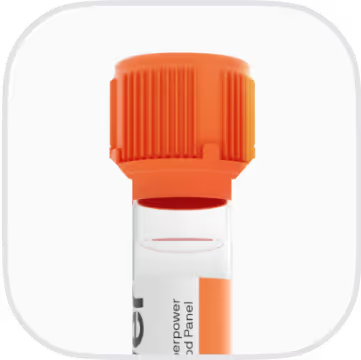What are Folate Deficiency biomarkers
Folate deficiency biomarkers are blood measures that map how your body handles vitamin B9, the nutrient that powers DNA building and methylation. Core markers include blood folate (serum/plasma folate), which reflects recent intake, and folate inside red cells (red blood cell folate), which mirrors longer‑term tissue stores set when those cells formed. Pathway markers add context: the amino acid homocysteine reflects the folate‑dependent recycling of homocysteine to methionine (one‑carbon remethylation), while methylmalonic acid reflects a neighboring vitamin B12–dependent reaction that helps distinguish folate lack from B12 lack. The complete blood count contributes morphologic clues: red cell size and appearance (MCV, megaloblastic changes) show the consequences of slowed DNA synthesis in the bone marrow. Taken together, these tests create a timeline and pathway view—what you ate recently, what your cells have in reserve, and whether key reactions are strained—so clinicians can identify folate deficiency, understand its physiological footprint, and correct it without overlooking related deficiencies.
Why is blood testing for Folate Deficiency important?
- Find out if low folate is driving anemia and fatigue.
- Flag anemia severity using hemoglobin to guide urgency and follow-up.
- Spot large red cells typical of folate deficiency through high MCV and MCH.
- Flag mixed deficiencies when RDW is high, suggesting simultaneous iron or B12 issues.
- Guide folic acid dosing and diet improvements based on folate level and indices.
- Support a healthy pregnancy by catching low folate linked to neural tube defects.
- Track recovery by rising hemoglobin and normalizing MCV, MCH, and RDW.
- Best interpreted with vitamin B12, iron studies, and your symptoms.
What insights will I get?
Folate deficiency blood testing is essential because folate is a key nutrient for DNA synthesis, red blood cell production, and overall cellular health. Low folate levels can disrupt energy metabolism, impair cognitive function, and increase cardiovascular risk by raising homocysteine levels. At Superpower, we assess folate status using a panel that includes Hemoglobin, Mean Corpuscular Volume (MCV), Mean Corpuscular Hemoglobin (MCH), Red Cell Distribution Width (RDW), and Folate.
Hemoglobin measures the oxygen-carrying protein in red blood cells, while MCV reflects the average size of these cells. MCH indicates the average amount of hemoglobin per red cell, and RDW shows the variation in red cell size. Folate is directly measured to assess body stores. In folate deficiency, red blood cells often become larger than normal (macrocytic), leading to increased MCV and sometimes elevated RDW. Hemoglobin may decrease, signaling anemia, and MCH can rise as cells become more filled with hemoglobin.
Together, these biomarkers reveal how well your body is producing stable, healthy red blood cells. Adequate folate supports normal cell division and prevents the development of fragile, oversized red cells that can compromise oxygen delivery and tissue function. Consistent values within healthy ranges suggest robust red cell production and systemic resilience.
Interpretation of these results can be influenced by factors such as pregnancy, age, chronic illness, certain medications, and laboratory assay differences. These variables may affect folate levels or red cell indices, so results are best understood in the context of your overall health profile.







.avif)



.svg)





.svg)


.svg)


.svg)

.avif)
.svg)










.avif)
.avif)
.avif)


.avif)
.avif)




.svg)




.avif)


